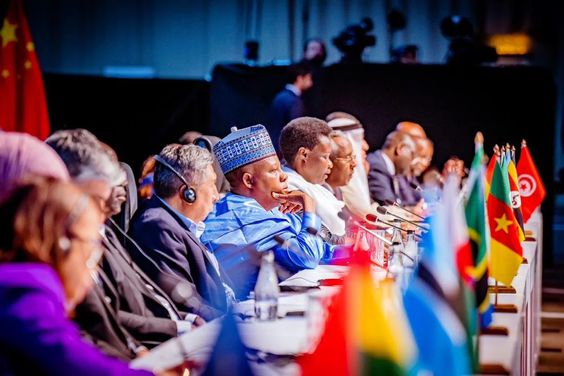Nigeria
Economic reforms under Tinubu, partnerships with Shettima, and strategic alliances to draw investment

President Bola Tinubu’s economic reforms and diplomatic connections, according to Vice President Kashim Shettima, are meant to entice foreign investments and joint ventures to the nation.
Shettima made this declaration in his address to world leaders at the third BRICS-Africa Outreach and BRICS Plus Dialogue on the margins of the ongoing 15th BRICS Summit, according to Mr. Olusola Abiola, Director, Information, Office of the Vice-President, in a statement.
The summit is taking place in Johannesburg, South Africa, at the Sandton Convention Centre.
Shettima addressed a sizable crowd on the topic of “BRICS and Africa: Partnership for Mutually Accelerated Growth, Sustainable Development, and Inclusive Multilateralism,” which included the presidents of China, India, Brazil, South Africa, and Russia.
He claims that the newly elected Nigerian administration, which took office less than three months ago, is analysing the factors and determining the extent and intensity of regional and international collaboration to pursue in order to position Nigeria as the desired ally and partner.
The subject, according to Shettima, “underscores the profound realisation that the cornerstone of stability within our complex multipolar landscape lies in fostering developmental partnerships.”
He praised the planners’ efforts for concentrating on the agenda themes that centre on “BRICS and Africa”.
In line with “the aspiration of the people we represent, the future citizens of a world that can ensure our collective prosperity,” the vice president said, the agenda is in line with the goals of the organisation.
He expressed Nigeria’s appreciation to the South African government and people for hosting the 15th BRICS Summit.
“The BRICS-Africa Outreach and BRICS-Plus Dialogue offer a singular forum for discussion, note comparison, and investigation of a win-win alliance that may emerge into a novel development-impelling force.
“The worldwide global governance framework to which we today cling was formed before the African continent and many other nations in the global south gained their independence.
Therefore, it is crucial to change global governance to reflect the reality of the modern world and to recognise the value of alliances that promote inclusion, shared wealth, and sustainable development.
Shettima gave the assurance that President Tinubu’s administration in Nigeria was committed to strengthening the global framework and governance with regard to all significant international issues.
These are especially in the areas of finance, climate change, closing the digital divide, implementing a comprehensive debt relief strategy, addressing food and energy insecurities, putting in place post-pandemic recovery measures, and promoting financial inclusion in developing nations.
In order to address the difficulties facing the world, he emphasised the necessity for a revived international collaboration that is efficient, representative, and inclusive.
Shettima stated that Nigeria is prepared for partnership and collaboration that will ensure a world ruled by respectable laws and norms.
He declared, “We seek partnership that offers chances for trade, wealth, and shared advancement for all without marginalisation based on geography, race, or genuine national connections.
Regarding the Sustainable Development Goals (SDGs) of the 2030 Agenda, he noted that the prospects for many poor nations to achieve the SDGs are still dim.
These countries face insurmountable difficulties and historical developmental risks. We must thus band together inside regional organisations and create a brand-new type of global collaboration.
This initiative attempts to promote changes in global economic governance while strengthening the voice and representation of developing or emerging market economies.
Shettima seeks powerful worldwide relationships by utilising the agricultural potentials of nations while emphasising partnership as a critical factor in tackling current global concerns.
In addition, he emphasised the importance of utilising renewable energy to transform Africa; encouraging technology, innovation, and job opportunities for comprehensive and fair progress; and nature-centered development strategies and joint efforts on climate change.
“Others” include fostering youth employment and skill development as a deterrent against terrorism, organised crime, and related challenges; proactive crisis prevention and heightened resilience; and promoting proactive involvement of business leadership in creating an improved and ideal environment for trade and economic exchanges in the Global South.
Cyril Ramaphosa, the president of South Africa and chair of the BRICS, underlined South Africa’s commitment to advancing the interests of the global south earlier in his speech on the third day of the summit.
As one of the outcomes of the Summit to broaden its goals, he announced the admission of six new full members: Argentina, Egypt, Iran, Saudi Arabia, Ethiopia, and United Arab Emirates.
Amb. Andrew Idi, the Consul-General of Nigeria in South Africa, Amb. Mohammed Mantra, and other senior government representatives attended the summit as part of the vice president’s team. (NAN
